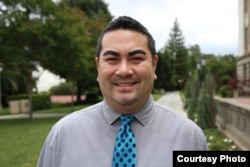When it comes to reaching one’s goals, there is a saying English speakers often use to explain the path to success. It goes like this:
“It’s not what you know, but who you know...”
Those words suggest that being hard working or knowledgeable is not the only way to get what you want in life. Very often it can even be more important to have a relationship with someone who can help you reach your goals.
Kenley Jones says that in a way, the same could be said of the process of applying to colleges and universities in the United States.
Jones is the director of international admissions at the University of Redlands, a private, liberal arts and science university in southern California. He says most U.S. colleges and universities often base their admissions decisions on an applicant’s test results and school work. But he admits that this information does not always do the best job of explaining the strengths of each applicant.
There are other parts of a college application that do more to describe personal qualities, says Jones.
For example, most U.S. colleges and universities ask applicants to list their activities outside the classroom. Also, many require applicants to provide a brief written statement that describes the kind of people they are.
But Jones notes that many students list activities which some admissions officials may know very little or nothing about. Some students may feel listing specific details of these activities is unimportant because they do not directly relate to their field of study, he says. And some students may be unwilling or unable to share this information about themselves in writing.
“There’s many cultures out there where students taking upon themselves to stand out…about certain…things that they’re involved in, socially, would be considered sort of a negative thing,” Jones told VOA. “So sometimes it’s very hard to get students, depending on the culture or situation, to expound on some of the things they’re doing…And it takes, sometimes an active voice from someone else to…bring that to life and to our attention as well.”
Jones argues that not every student has to be the strongest writer. That is especially true if students are applying to a program in which writing is not a major part of their duties. But in that case, they will need a recommendation from someone who is skilled in writing a letter in support of the applicant.
Most U.S. colleges and universities require applicants to provide at least one letter of recommendation, Jones says. However, these statements should not be from just anyone who knows the applicant. After all, he notes, admissions officials expect most applicant’s friends and family to be extremely supportive of the student.
Schools want to hear from people who will speak honestly and objectively about an applicant, says Jones. Admissions officials want to hear what an individual outside the applicant’s immediate circle of contacts thinks of that person. And they want to hear examples of the better qualities the student has demonstrated over the years.
Jones adds that, depending on who offers it, a letter of recommendation can bring attention to a quality a student might not think about. For example, an employer might be able to describe leadership qualities that an applicant may not know he or she is demonstrating.
However, recommendations do not always have to say how great an applicant is, he adds. The person writing the recommendation can explain to admissions officials how a student overcame a serious mistake. The writer could, for example, say how he or she witnessed the applicant getting caught doing something dishonest in school. But then the writer could say how the applicant learned the seriousness of the offense and demonstrated a change in behavior.
“A letter of recommendation can add a little bit of context,” Jones said. “It can add a little bit of strength. It can clarify some things and really push the decision, typically, in favor of the student.”
That is why asking the right people to write a letter of recommendation is important, says Jones. Some colleges and universities have rules about exactly who should write such letters. Admissions officers often want the writer to be a teacher the applicant studied under, often teachers of specific subjects. Jones says applicants should choose someone they have studied under recently.
If a school lets applicants name whomever they want to write a recommendation, he says, there are often plenty of people who would be a good choice. This includes religious leaders, leaders of sports teams, volunteer and social group organizers, work supervisors and co-workers. Almost anyone an applicant feels they have a strong relationship with would be a good person to ask.
Some applicants might feel unsure about who in their lives they might have this kind of connection with, Jones notes. In that case, the applicant should ask teachers, friends and family members who they think might be able to provide a strong recommendation.
But he also says just because an applicant wants a recommendation from a specific person does not mean that person will know how to write one.
“You want somebody who feels comfortable writing on your behalf,” he said. “And I think that’s a good question to ask someone that you want to write on your behalf. Are they comfortable with writing a letter of recommendation for you? And even if they are comfortable I think there are some things students can do to get the most out of that recommendation.”
Jones notes that applicants have no control over what people will write about them. Most schools will not let applicants read a letter of recommendation before the writer sends it. But applicants can discuss the things they think are important about themselves and make suggestions before the letter is written. And applicants should ask for letters of recommendation well before the final date that schools will accept them. That way the writer has plenty of time to consider everything they want to say in support of the applicant.
I’m Pete Musto.
And I’m Dorothy Gundy.
Pete Musto reported this story for VOA Learning English. George Grow was the editor.
We want to hear from you. How common is it for colleges and universities in your country to ask for letters of recommendation from applicants? Who do they expect these letters to come from? Write to us in the Comments Section or on our Facebook page.
_____________________________________________________________
QUIZ
_____________________________________________________________
Words in This Story
apply(ing) – v. to ask formally for something such as a job, admission to a school, or a loan
specific – adj. special or particular
negative – adj. harmful or bad
expound – v. to give details about something
recommendation – n. the act of saying that someone or something is good and deserves to be chosen
objectively – adv. done based on facts rather than feelings or opinions
context – n. the group of conditions that exist where and when something happens
favor – n. in support of someone
comfortable – adj. not worried or troubled









